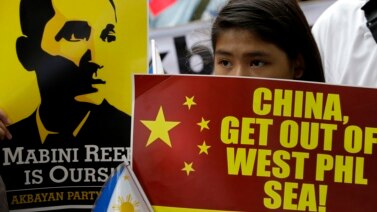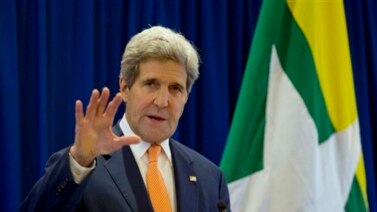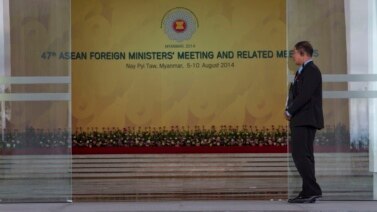
President Barack Obama is making preparations for a week-long trip to Asia and Australia. The president arrives in Beijing on Monday. During his visit, Mr. Obama plans to meet with Chinese President Xi Jinping. He also will attend the yearly meetings of APEC -- the Asia-Pacific Economic Cooperation forum.
On Wednesday, Mr. Obama goes to Myanmar for the East Asia Summit and a meeting of the Association of Southeast Asian Nations. The trip ends at the "Group of 20" talks in Brisbane, Australia.
North Korea is not a member of either APEC or ASEAN, but its nuclear activities are sure to be discussed at these meetings. Kim Han-kwon is with the Asan Institute for Policy Studies in Seoul.
He says the issue of North Korea is not just a subject for the Korean peninsula and East Asia, but one that can bring a big change in the security system of Asia and the Pacific. So, he says, related countries will hold discussions -- either officially or unofficially -- at the meetings.
This week, South Korean media reported that North Korea has opened a new uranium enrichment center at its main nuclear area. Some observers believe North Korea has made progress in its effort to build an atomic bomb. But the North is still believed to be working on a way to make a nuclear weapon smaller.
In recent years, observers thought the North Korean nuclear issue would be one in which the United States and China could cooperate to reduce tensions.
China reportedly became angry with North Korea after the North carried out a nuclear test in 2013. The test was a violation of United Nations resolutions. But China has shown little interest in supporting strong sanctions against North Korea. Chinese officials fear such measures could threaten security in the country.
President Obama is to meet with South Korean President Park Geun-hye in Myanmar, also known as Burma. They will likely discuss recent signals coming from Pyongyang. The North Korean government has at times shown an interest in restarting international talks on its nuclear program. But the North continues to send hostile signals toward both South Korea and the United States.
The leaders of China, Russia and India are also expected in Myanmar’s capital for the ASEAN meetings. But observers have limited expectations for the talks.
The ASEAN way of compromise and non-intervention has helped keep Southeast Asia at peace for years. And that is the only effective way for the group to operate. So says Rodolfo Severino of the Institute of Southeast Asian Studies in Singapore. He spoke to VOA on Skype.
“No, ASEAN is not about breakthroughs. ASEAN is, works on an incremental basis.”
The talks are to lead the launch of the ASEAN Economic Community next year. The AEC is supposed to help increase cross-border trade and travel.
But a document released to VOA before the meeting deals with another issue: the South China Sea. A government representative from an ASEAN country provided the information. The document is a proposal for a statement that would normally be released at the end of the conference. It notes progress on a Code of Conduct -- some would call them "rules" -- for the South China Sea. And it urges ASEAN members to settle their territorial disputes with China.
The document also criticizes North Korea for testing missiles and condemns Islamic State militants in the Middle East.
I’m Christopher Cruise.
VOA correspondents Brian Padden, Steve Herman and Sok Khemara reported thsi story. George Grow wrote this it for VOA Learning English. Mario Ritter edited the story.
Words in This Story
trip - n. a movement from one place to another, usually a long distance
meet - v. to come together with someone or something at the same time and place
nuclear - adj. of or about the energy produced by splitting atoms or bringing them together; of or about weapons that explode by using energy from atoms
security - adj. protecting; freeing one from danger or harm
Now it’s your turn to use these Words in this Story. In the comments section, write a sentence using one of these words and we will provide feedback on your use of vocabulary and grammar.


